Unit 4 Don’t eat in class.(Section B 2a-2c)
文档属性
| 名称 | Unit 4 Don’t eat in class.(Section B 2a-2c) |
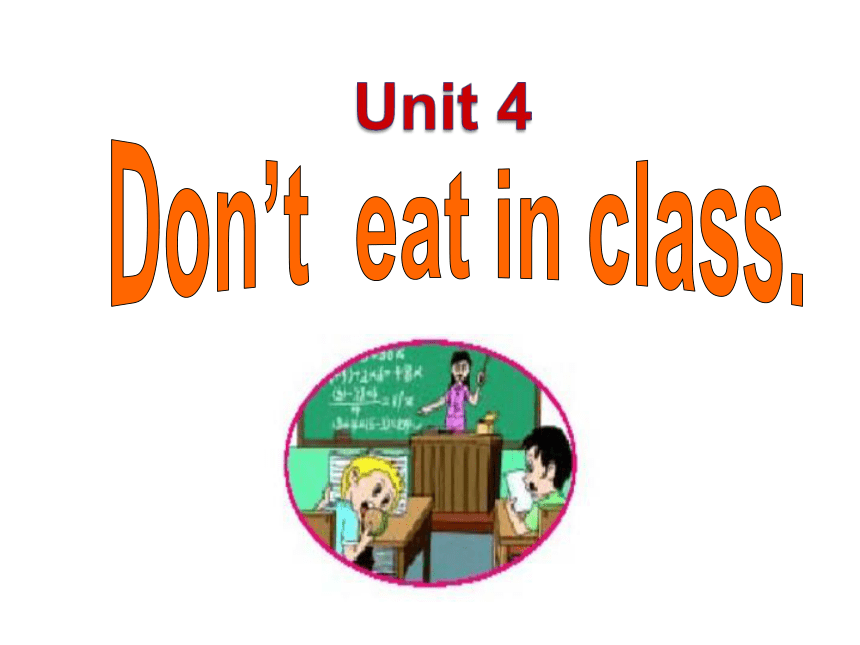
|
|
| 格式 | zip | ||
| 文件大小 | 849.7KB | ||
| 资源类型 | 教案 | ||
| 版本资源 | 人教新目标(Go for it)版 | ||
| 科目 | 英语 | ||
| 更新时间 | 2013-03-28 00:00:00 | ||
图片预览

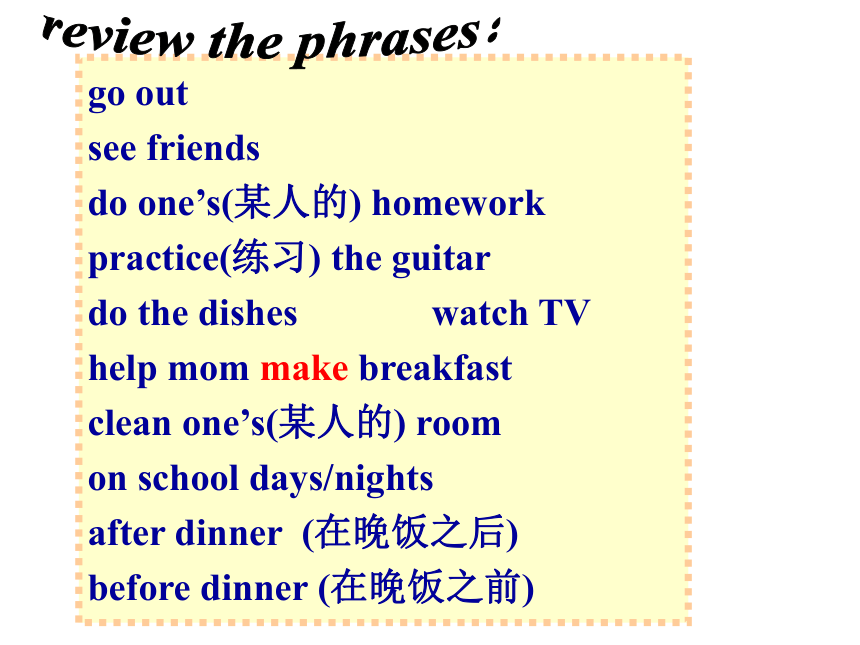
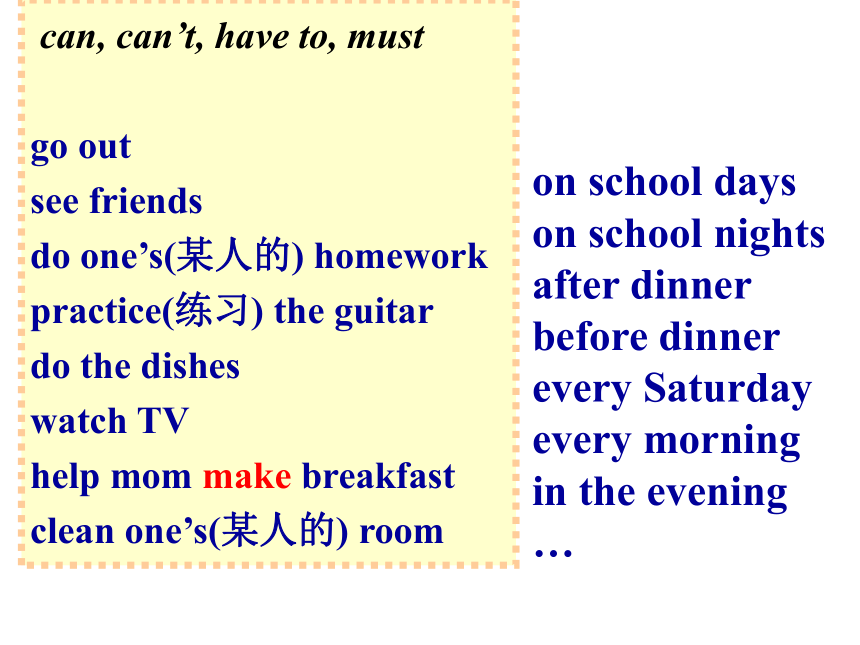
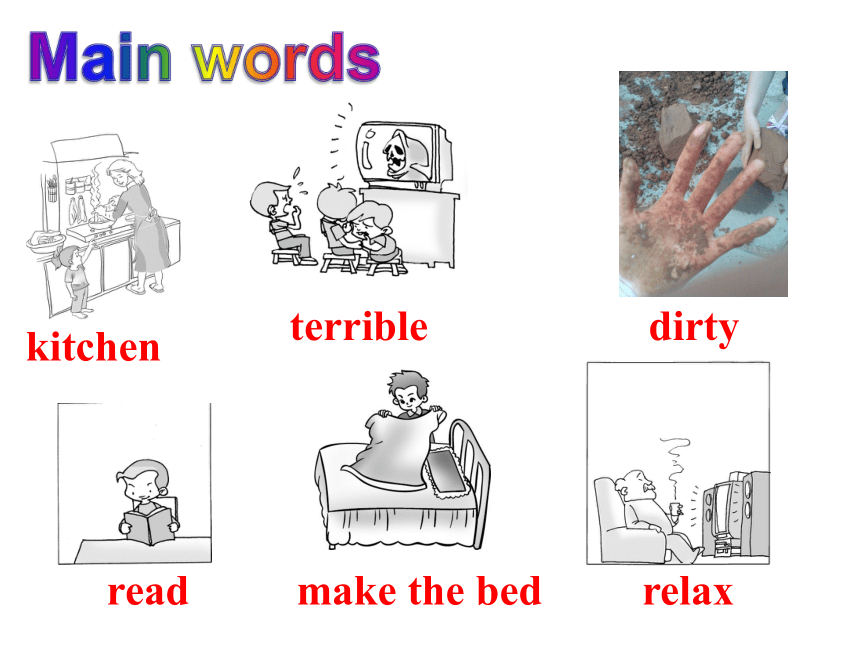
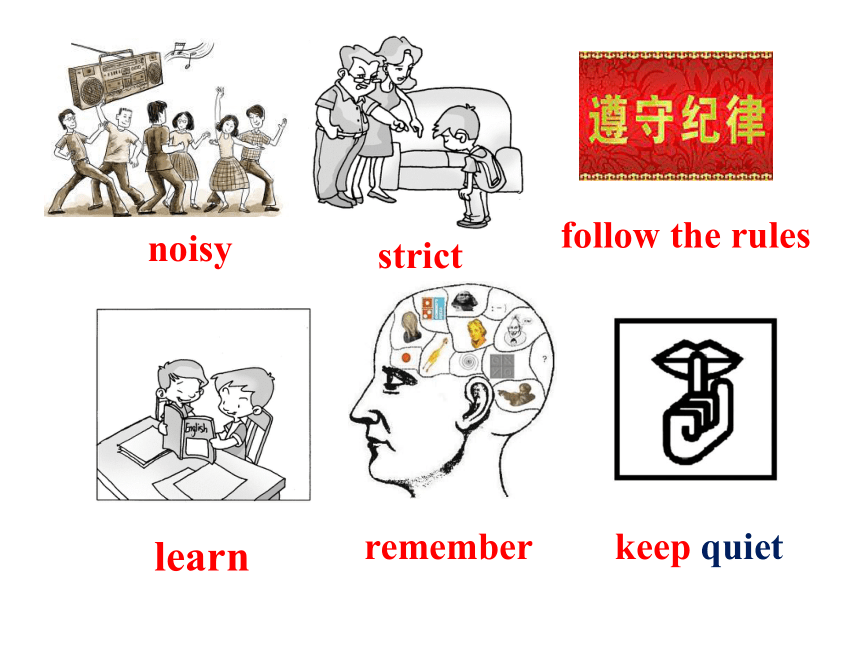

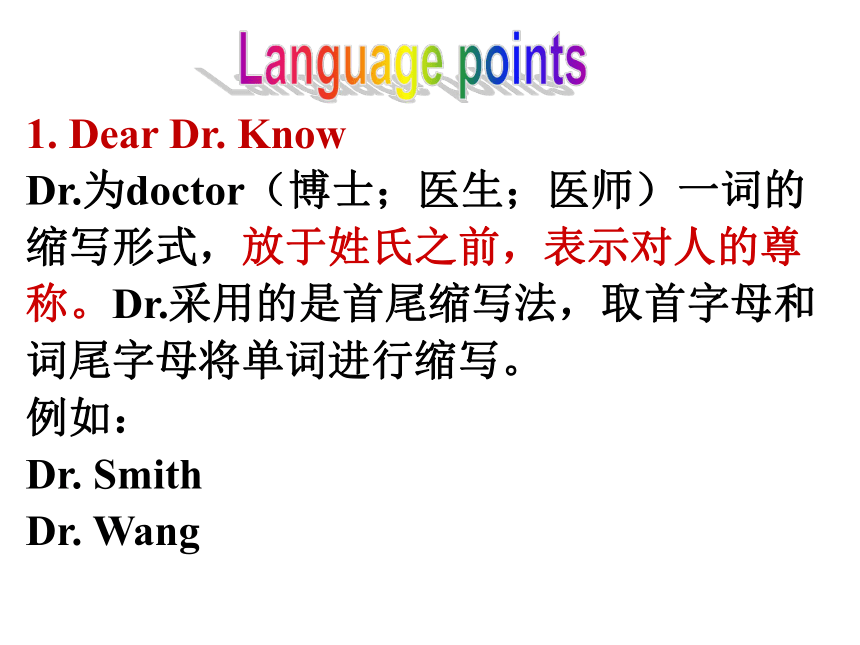
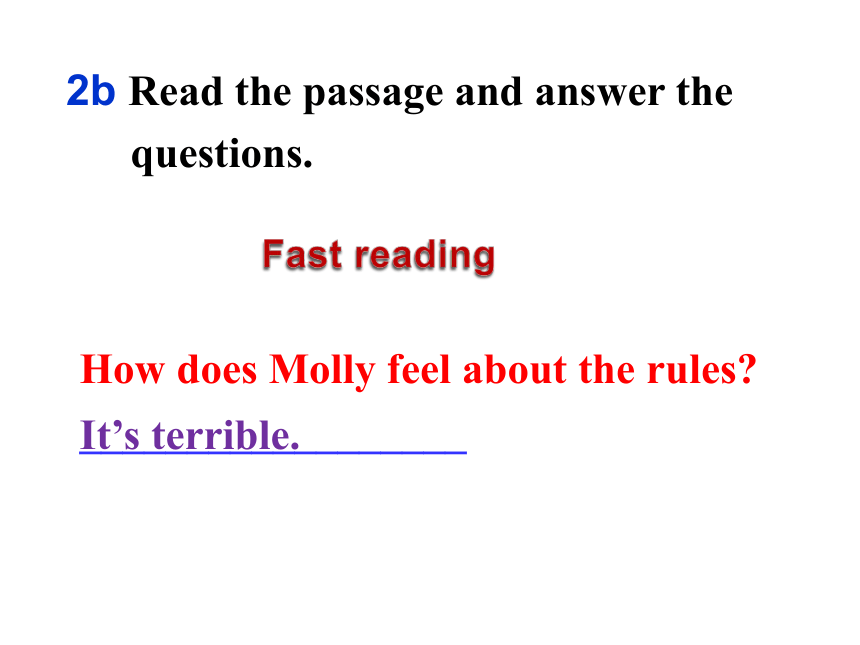
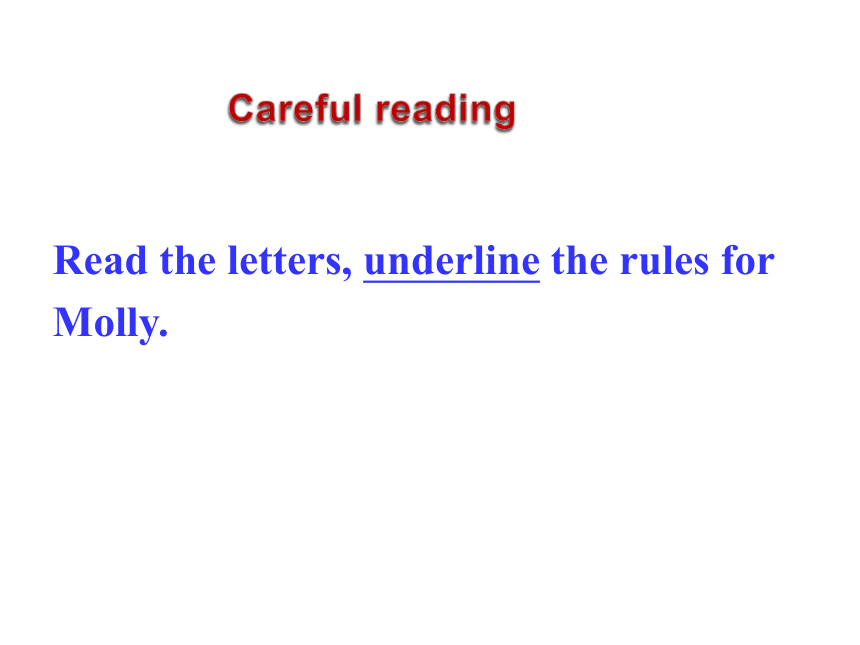
文档简介
课件21张PPT。Don’t eat in class.Unit 4go out
see friends
do one’s(某人的) homework
practice(练习) the guitar
do the dishes watch TV
help mom make breakfast
clean one’s(某人的) room
on school days/nights
after dinner (在晚饭之后)
before dinner (在晚饭之前)review the phrases: can, can’t, have to, must
go out
see friends
do one’s(某人的) homework
practice(练习) the guitar
do the dishes
watch TV
help mom make breakfast
clean one’s(某人的) roomon school days
on school nights
after dinner
before dinner
every Saturday
every morning
in the evening
…terriblereaddirtykitchenmake the bedrelaxMain wordsnoisystrictfollow the rulesrememberlearnkeep quiet2a When you are unhappy about something, who do you like to talk to.Lead in1. Dear Dr. Know
Dr.为doctor(博士;医生;医师)一词的缩写形式,放于姓氏之前,表示对人的尊称。Dr.采用的是首尾缩写法,取首字母和词尾字母将单词进行缩写。
例如:
Dr. Smith
Dr. WangLanguage points2b Read the passage and answer the
questions.Fast readingHow does Molly feel about the rules?
__________________It’s terrible.Careful readingRead the letters, underline the rules for
Molly.通读全文,掌握文章的大意。
2. 题目要求我们寻找有关Molly在家庭及在学校里的规则。表达规则的句子常为祈使句、或含有must及have的句子。
3. 读短文寻找这种类型的句子。根据句意确定是否是她的规则。
4. 最后, 再读一遍课文, 检查一下答案的正确性。阅读指导Dear Dr. Know,
There are too many rules! At 6:00 a.m., my mom says, “Get up now and make your bed!” After breakfast, my mom always says, “Don’t leave the dirty dishes in the kitchen!” After that, I run to school because I can’t be late. At school, we have more rules—
don’t be noisy, don’t eat in class,…Check the answers My dad says I can’t play basketball after school because I must do my homework. I can play only on weekends. After dinner, I can’t relax either. I must read a book before I can watch TV. But I have to go to bed before 10:00. Rules, rules, rules! It’s terrible! What can I do, Dr. Know?
Molly Brown, New York.
make the bed/make one’s bed 整理床铺
e.g. Bob always makes his bed himself. 鲍勃总是自己整理床铺。
Can you make the bed? 你会整理床铺吗?Language points
2. noisy adj. 意为“吵闹的”
e.g. We can’t be noisy in class. 我们不能在教室里大吵大闹。3. After dinner, I can’t relax either. 晚饭后我也不能轻松。
副词either表示“也”,用于否定句句末,用法与表示肯定或陈述的副词too相似,可用逗号与语句的主题隔开。
e.g. You like English. I like it, too.
你喜欢英语,我也喜欢。
My father can’t speak English. My
mother can’t (speak it), either.
我爸不会讲英语,我妈也不会。4. before 在……之前; after 在……之后;
e.g. Wash your hands before dinner.
饭前洗手。
Do your homework after school.
放学后做作业。5. There are a lot of things you can do.
有许多你可以做的事情。
此句中a lot of things you can do是一个名词短语,句子you can do起着修饰,限定名词things的作用。英语中当句子限定修饰名词时要放在该名词之后。
e.g. There are a lot of songs you can sing.
有许多歌曲你可以唱。
6. be strict (with sb.) (对某人)严格的
e.g. Our math teacher is very strict. 我们的数学老师很严格。
Are your parents strict with you? 你的父母对你严格吗?1.There are too many rules.
2.Get up now and make your bed.
3.Don’t leave the dirty dishes in the kitchen.
4.Don’t be noisy.
5.After dinner, I can’t relax either.
6.I must read a book before I can watch TV.
7.It’s terrible.
8.There are a lot of things you can do.
9.Parents and schools are sometimes strict, but, remember, they make rules to help us.
10.We have to follow the rules.1. Molly ____ play basketball on school days, but she ___ play it on weekends.
2. Molly ____ do her homework first when she gets home.
3. Molly ____ read a book after dinner before she ___ watch TV.2c Read the letters again. Complete
the sentences with have to/must,
can or can’t.can’tcanmustmustcan4. At school, Molly ____ be noisy or eat in class.
5. Parents and schools make rules to help students. So students ______ follow the rules.can’thave to
see friends
do one’s(某人的) homework
practice(练习) the guitar
do the dishes watch TV
help mom make breakfast
clean one’s(某人的) room
on school days/nights
after dinner (在晚饭之后)
before dinner (在晚饭之前)review the phrases: can, can’t, have to, must
go out
see friends
do one’s(某人的) homework
practice(练习) the guitar
do the dishes
watch TV
help mom make breakfast
clean one’s(某人的) roomon school days
on school nights
after dinner
before dinner
every Saturday
every morning
in the evening
…terriblereaddirtykitchenmake the bedrelaxMain wordsnoisystrictfollow the rulesrememberlearnkeep quiet2a When you are unhappy about something, who do you like to talk to.Lead in1. Dear Dr. Know
Dr.为doctor(博士;医生;医师)一词的缩写形式,放于姓氏之前,表示对人的尊称。Dr.采用的是首尾缩写法,取首字母和词尾字母将单词进行缩写。
例如:
Dr. Smith
Dr. WangLanguage points2b Read the passage and answer the
questions.Fast readingHow does Molly feel about the rules?
__________________It’s terrible.Careful readingRead the letters, underline the rules for
Molly.通读全文,掌握文章的大意。
2. 题目要求我们寻找有关Molly在家庭及在学校里的规则。表达规则的句子常为祈使句、或含有must及have的句子。
3. 读短文寻找这种类型的句子。根据句意确定是否是她的规则。
4. 最后, 再读一遍课文, 检查一下答案的正确性。阅读指导Dear Dr. Know,
There are too many rules! At 6:00 a.m., my mom says, “Get up now and make your bed!” After breakfast, my mom always says, “Don’t leave the dirty dishes in the kitchen!” After that, I run to school because I can’t be late. At school, we have more rules—
don’t be noisy, don’t eat in class,…Check the answers My dad says I can’t play basketball after school because I must do my homework. I can play only on weekends. After dinner, I can’t relax either. I must read a book before I can watch TV. But I have to go to bed before 10:00. Rules, rules, rules! It’s terrible! What can I do, Dr. Know?
Molly Brown, New York.
make the bed/make one’s bed 整理床铺
e.g. Bob always makes his bed himself. 鲍勃总是自己整理床铺。
Can you make the bed? 你会整理床铺吗?Language points
2. noisy adj. 意为“吵闹的”
e.g. We can’t be noisy in class. 我们不能在教室里大吵大闹。3. After dinner, I can’t relax either. 晚饭后我也不能轻松。
副词either表示“也”,用于否定句句末,用法与表示肯定或陈述的副词too相似,可用逗号与语句的主题隔开。
e.g. You like English. I like it, too.
你喜欢英语,我也喜欢。
My father can’t speak English. My
mother can’t (speak it), either.
我爸不会讲英语,我妈也不会。4. before 在……之前; after 在……之后;
e.g. Wash your hands before dinner.
饭前洗手。
Do your homework after school.
放学后做作业。5. There are a lot of things you can do.
有许多你可以做的事情。
此句中a lot of things you can do是一个名词短语,句子you can do起着修饰,限定名词things的作用。英语中当句子限定修饰名词时要放在该名词之后。
e.g. There are a lot of songs you can sing.
有许多歌曲你可以唱。
6. be strict (with sb.) (对某人)严格的
e.g. Our math teacher is very strict. 我们的数学老师很严格。
Are your parents strict with you? 你的父母对你严格吗?1.There are too many rules.
2.Get up now and make your bed.
3.Don’t leave the dirty dishes in the kitchen.
4.Don’t be noisy.
5.After dinner, I can’t relax either.
6.I must read a book before I can watch TV.
7.It’s terrible.
8.There are a lot of things you can do.
9.Parents and schools are sometimes strict, but, remember, they make rules to help us.
10.We have to follow the rules.1. Molly ____ play basketball on school days, but she ___ play it on weekends.
2. Molly ____ do her homework first when she gets home.
3. Molly ____ read a book after dinner before she ___ watch TV.2c Read the letters again. Complete
the sentences with have to/must,
can or can’t.can’tcanmustmustcan4. At school, Molly ____ be noisy or eat in class.
5. Parents and schools make rules to help students. So students ______ follow the rules.can’thave to
同课章节目录
- Unit 1 Can you play the guitar?
- Section A
- Section B
- Unit 2 What time do you go to school?
- Section A
- Section B
- Unit 3 How do you get to school?
- Section A
- Section B
- Unit 4 Don't eat in class.
- Section A
- Section B
- Unit 5 Why do you like pandas?
- Section A
- Section B
- Unit 6 I'm watching TV.
- Section A
- Section B
- Review of Units 1-6
- Unit 7 It's raining!
- Section A
- Section B
- Unit 8 Is there a post office near here?
- Section A
- Section B
- Unit 9 What does he look like?
- Section A
- Section B
- Unit 10 I'd like some noodles.
- Section A
- Section B
- Unit 11 How was your school trip?
- Section A
- Section B
- Unit 12 What did you do last weekend?
- Section A
- Section B
